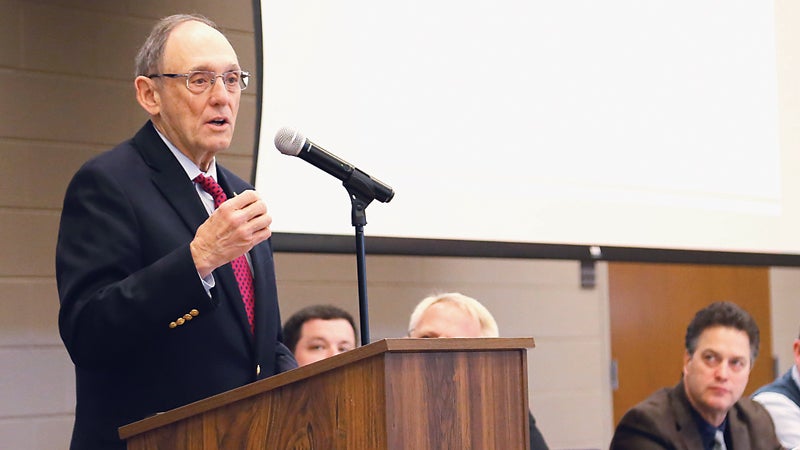Elected officials talk economy, opioid crisis
Published 4:50 pm Friday, March 9, 2018

- Star Photo/Abby Morris-Frye U.S. Rep. Phil Roe provides constituents with an update from Washington D.C. during Friday morning's Legislative Breakfast event.
Residents heard updates from local, state, and federal elected officials during Friday morning’s Legislative Breakfast, and much of the focus was the economy and combating the opioid epidemic plaguing the state.
The Elizabethton/Carter County Chamber of Commerce hosted Friday’s Legislative Breakfast, which is an annual event that brings together elected officials from the local, state, and federal levels to meet with constituents.
During the most recent economic recession, many jobs were lost across the country according to U.S. Rep. Phil Roe. While there has been job growth in the nation, Roe said much of that growth had been centered around a few major metropolitan areas.
“That’s a real struggle for us in rural America, where I live and where I will live the rest of my life,” Roe said.
However, more economic growth has been seen since Congress passed its tax reform package at the end of 2017, according to Roe.
“I think you are going to see an incredible growth in this country,” Roe said.
While the economy may be on an upturn, Tennessee is facing a serious issue with the opioid crisis according to several of the panelists during Friday morning’s breakfast.
State Sen. Jon Lundberg described the crisis as “frightening,” especially as it relates to the children impacted by drug abuse and those suffering from Neonatal Abstinence Syndrome (NAS), which is the medical diagnosis for a child who is born detoxing from drugs.
“It scares me,” Lundberg said. “What we talked about before was NAS babies. Now we have NAS children. We have NAS students.”
Those children are growing up facing a myriad of challenges which school systems have not dealt with on this scale before. Lundberg said he has been part of discussions to create a “recovery school” for children who have been diagnosed with NAS. The school would be staffed by teachers who receive special training in working with children who have drug or alcohol addiction issues as well as behavioral or psychological issues related to NAS.
According to Lundberg, there are several bills making their way through the Tennessee General Assembly to combat the opioid crisis on a variety of fronts. His colleague on the House of Representatives side, State Rep. John Holsclaw, also touched on the multi-faceted approach being taken by the legislature.
“We’ve taken down the pill mills,” Holsclaw said. “Now we are looking at the doctors and how they are prescribing these medicines.”
According to Holsclaw, the legislature is considering placing additional restrictions on the prescribing of opioid medications, such as decreasing the number of days per prescription from a month’s supply to a week’s supply.
Field representatives for Senators Lamar Alexander and Bob Corker, who were not able to attend the event Friday due to Senate being in session, both praised the work of state officials in addressing the opioid epidemic.
“We are not going to solve the problem from Washington, but we can give you some resources to address it,” said Lana Moore, Field Representative for Alexander.
According to Moore, local communities and state agencies and officials are better equipped to fight the battle against opioids because they are on the front lines and know what the needs are.
While many of those present touched on the impact of the opioid crisis on residents and families, Jane Jolley, Field Representative for Corker, spoke to the bigger, overall impact of the epidemic. The state’s battle against opioid abuse could have a severe impact on economic development efforts in the state, Jolley said.
“It’s hard to recruit businesses when we can’t get our workforce to pass a drug test,” Jolley said.




